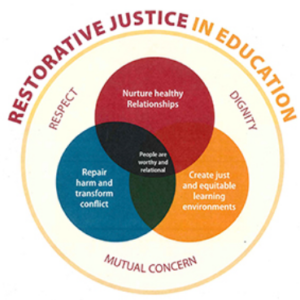Proactive Peacebuilding
Proactive Peacebuilding & Restorative Practices
At LM, we want students to know they are loved and valued, which enables them to value and love each other. Our core values integrated with a restorative approach, “are intended to set expectations for all involved in the school community…They may include respect, truthfulness, dependability, self-control, self-discipline, acceptance, responsibility, and accountability” (Amstutz & Mullet, p. 25).
We are committed to a restorative framework for discipline that builds positive and peaceful relationships, encourages accountability, and enables pathways to restore harm and change behavior. As a school within the Anabaptist faith tradition, we express that “Jesus is the center of our faith, community is the center of our lives, and reconciliation is the center of our work” (Palmer Becker, 2008). Proactive peacebuilding and involving students in a caring school community is our first approach to preventing student disciplinary issues. We expect most LM students will have little problem following school expectations. Reconciliation strategies, or restorative practices, are the approach taken when disciplinary issues arise.
peacebuilding and involving students in a caring school community is our first approach to preventing student disciplinary issues. We expect most LM students will have little problem following school expectations. Reconciliation strategies, or restorative practices, are the approach taken when disciplinary issues arise.
Lancaster Mennonite School is committed to a restorative rather than punitive approach to discipline which may include counseling, apologies, prayer, reconciliation and parental involvement. Restorative discipline is based on a motivation of love to help each child become conformed to the image of Jesus. However, student choices determine consequences, positive or negative, and we believe that students must accept responsibility for their behavior.
Katherine Evans and Dorothy Vaandering, from The Little Book of Restorative Justice in Education
Tiered Restorative Justice and Support
At LM, a tiered approach to restorative justice enables all students to engage with restorative practices at levels which meet their individual needs. Families can contact principals for more detailed information regarding disciplinary responses. Restorative practices help our school:
- Build relationships to create a caring, Christ-centered community
- Prevent or transform conflict peacefully before it escalates
- Engage students and community members in repairing harm and transforming conflict